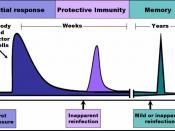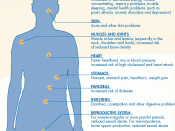The fast paced life we expereicne on a daily basis can be very demanding on our minds and bodies. Chronic stress can be linked to many physical and mental conditions that drain us to the point of exhaustion. Prolonged stress weakens the immune system and makes us more vulnerable to many types of health conditions such as high blood pressure, heart disease and depression. On the other side, a little stress can be good for us mentally; it heightens our emotions, improves our memories, and sharpens our focus which can help with everyday tasks.
THE STRESS RESPONSEThe most basic definition of the stress response is the "Fight or Flight" reaction. Being confronted by a dangerous or stressful situation causes your body to respond in an accelerated way. The body releases chemicals and hormones in the brain such as adrenaline and cortisol. Red blood cells flood the immune system as it gears up for the possibility of injury.
Energy stores are diverted to muscle strength, brain function, heart and lungs and away from less important functions (digestion, hunger). Your stress response helps you deal appropriately with a dangerous situation.
The same Fight or Flight response that changes your energy level(s) due to dangerous situations can work in similar ways in other situations. For example, A job interview or falling in love can cause similar physical reactions. Deciphering between what is happiness and what is stress depends on the particular situation and how we perceive it. If we perceive the event as negative, then we set ourselves up to experience stress. To be calm is to return yourself to a healthier state physically and mentally. The fight or flight response can increase to the point of becoming overloaded. Becoming overloaded is a result from the stress we experience in our lives. Bad relationships or stress in the workplace can cause us to feel edgy, tired and rundown. This prolonged state of mind, over time, can cause illness unless we take time to adopt the coping mechanisms necessary to induce relaxation. One study showed rats that were under stress over time developed seriously impaired immune responses. When the stress was alleviated for one week, the immune system bounced back.
WHO IS AT RISKThe body's genetic makeup can influence how our body responds to stress. There are 20 different genes and different chromosomes that determine whether a person will get inflammatory arthritis. Having all 20 genes will pretty much guarantee you the chance to get it. Two genes will give little chance and five genes will give about 50% chance for the disease. Early stressful experiences can influence and/or alter the way our brains develop and may actually change them. Research shows that children who are exposed to stressors early in life become more sensitive to stressors and are at a higher risk for health consequences.
STRESS AND IMMUNE SYSTEMCortisol is a hormone central to fight or flight; it can be both positive and negative for the immune system. If cortisol levels in the brain are intensified from excess stress, the immune cells can become sluggish and eventually die making an individual more susceptible to infection. Some people whose body isn't capable of producing the correct coritisol levels can result in autoimmune diseases such as asthma and fatigue. Cortisol also influences and directs where your body stores fat, targeting the belly where an increase of diabetes and heart disease is prominent.
In conclusion, stress greatly affects our physical and mental wellìì- being. It can manifest itself either physically or mentally. Remember, STRESS CAN BE A KILLER!Source: Natural Health 26.n3(May-June 1996)p 68





